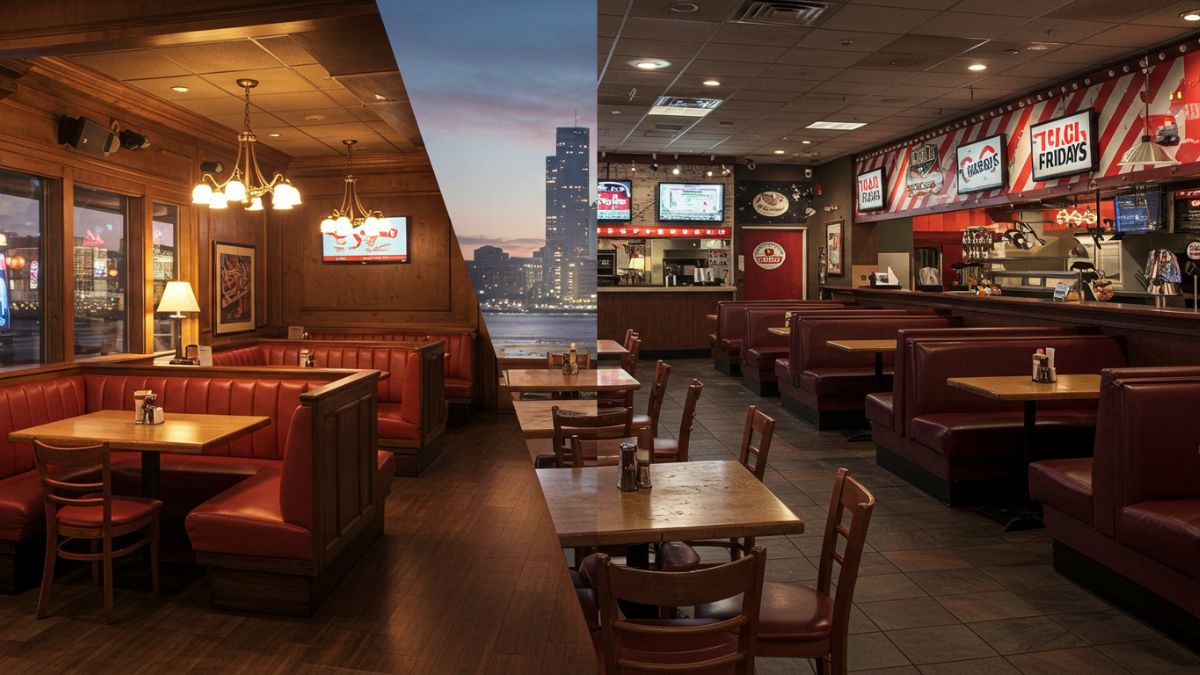The news about Red Lobster TGI Fridays closing has caused quite a stir among American diners who have fond memories of seafood feasts and sizzling appetizers. These iconic restaurant chains have served families, friends, and professionals for decades. So why are some locations shutting down? Is this a sign of industry collapse, or is it part of a larger transformation? Let’s dive deep into the reasons behind these closures, how it affects loyal customers, and what the future holds.
A Glimpse into the Legacy of Red Lobster and TGI Fridays
For decades, Red Lobster and TGI Fridays have been synonymous with affordable luxury dining. Whether it was endless shrimp at Red Lobster or half-price apps at Fridays, both chains carved a niche in the American casual dining market.
Founded in the late 1960s, both companies expanded rapidly through the 80s and 90s, riding the wave of suburbanization and middle-class spending. However, today’s restaurant landscape is vastly different, leading to the recent wave of Red Lobster TGI Fridays closings reports.
What’s Driving the Closures?
1. Changing Consumer Behavior
Modern diners prioritize convenience, speed, and health-conscious options. While Red Lobster and TGI Fridays offer flavorful dishes, they’ve struggled to adapt quickly to trends like plant-based meals, mobile ordering, and takeout-first formats. The traditional dine-in model that both brands championed no longer aligns with how many people choose to eat.
2. Inflation and Rising Costs
The costs of operating a restaurant have surged since the pandemic. From seafood prices affecting Red Lobster’s core menu to rising wages and rent, many locations became financially unsustainable. Inflation has also changed how customers spend, with more people cooking at home or choosing fast-casual alternatives.
3. Overexpansion and Saturation
Both brands once aimed to be everywhere, leading to market saturation. Having multiple restaurants in the same city diluted profits and made it harder to sustain underperforming locations. As a result, closing outlets became a necessary step toward survival.
Is This the End of the Line?
Despite headlines about Red Lobster TGI Fridays closing locations, this doesn’t mean the brands are disappearing altogether. What we’re witnessing is more of a corporate reset. Businesses are reevaluating their portfolios and shedding unprofitable units. Many closures are part of a wider strategy to streamline operations, improve profitability, and modernize the dining experience.
What Happens to the Employees?
The most immediate impact of these closures is on the workforce. Servers, cooks, and managers at affected locations are facing sudden job loss. Some companies have offered severance pay or relocation opportunities, while others haven’t been as generous. Labor unions and advocacy groups are calling for better treatment of laid-off staff, pushing the industry to take responsibility.
However, with the hospitality sector still in need of experienced workers, many employees are hopeful about finding new roles elsewhere, especially in fast-growing restaurant groups or emerging food concepts.
How Loyal Customers Are Reacting
Reactions to the Red Lobster TGI Fridays closings news have been emotional. Social media has been flooded with nostalgic posts and frustration over losing favorite dining spots. For many, these restaurants were places of celebration—birthdays, anniversaries, and casual family meals.
However, some customers agree that the menus became outdated or the service declined. Reviews in recent years pointed to declining food quality and a lack of innovation. These customer experiences have likely played a role in the decision to close certain locations.
The Broader Trend in Casual Dining
Red Lobster and TGI Fridays aren’t alone. Other chains like Applebee’s, Chili’s, and Olive Garden have also struggled with profitability and relevance. The casual dining industry is going through a reinvention phase. New players, including food trucks, virtual kitchens, and app-based ordering systems, are drawing away younger audiences.
In this new era, consumers demand:
-
Speed and convenience
-
Customizable meals
-
Healthier ingredients
-
Technology integration
Brands that fail to deliver on these fronts are quickly losing ground.
Will the Brands Rebrand and Rebuild?
Yes, both Red Lobster and TGI Fridays are actively exploring new strategies. These include:
Red Lobster’s New Approach
-
Launching limited-time offers with better pricing.
-
Introducing digital ordering and loyalty apps.
-
Refreshing store interiors to modernize the experience.
TGI Fridays’ Revamp Plan
-
Shifting toward smaller, urban locations.
-
Embracing “Fridays To Go” for faster service.
-
Streamlining menus to focus on quality over quantity.
These efforts suggest that while some doors are closing, others are being reimagined.
The Future of Dining Out
The Red Lobster TGI Fridays closing phenomenon reflects a broader transformation in the food industry. Casual dining isn’t dying—it’s evolving. To stay relevant, legacy brands must embrace change, innovate with purpose, and listen to customer feedback.
Even amid closures, there’s opportunity. Smaller, more efficient restaurants with digital enhancements and modern menus can breathe new life into these beloved names.
What Can Consumers Do?
If you want to support your favorite restaurants, consider the following:
-
Visit regularly and bring friends or family.
-
Leave positive reviews online.
-
Offer feedback on what you’d like to see improved.
-
Follow them on social media and engage with their promotions.
Every bit of support helps local outlets survive and adapt.
Conclusion
The headlines about Red Lobster TGI Fridays closing locations have sparked concern, but they don’t mark the end. Instead, they signal a necessary transformation in an industry grappling with new challenges and expectations. While not every restaurant will survive, those that adapt can thrive in a changing market.
For diners, this is a chance to be part of the journey—supporting innovation, embracing change, and cherishing the experiences that make dining out special.











